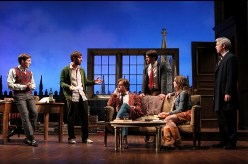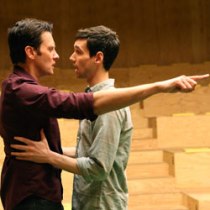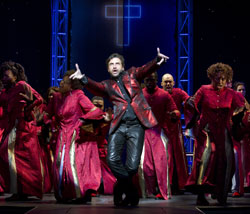Review: The Common Pursuit
May 25th

Sometimes, memories are best left alone. Such is my experience with seeing the new revival of Simon Gray’s The Common Pursuit being presented by the Roundabout Theatre Company. This high-toned soap opera about a group of Cambridge students involved in a literary magazine is unfortunately showing its age.
I remember having loved the original 1986 production at the now-gone Promenade Theater, but then again, its cast included such future stars as Dylan Baker, Nathan Lane and Peter Friedman. This current incarnation directed by Moises Kaufman features an ensemble of relative unknowns, some of whom may very well go on to have stellar careers. But there’s no such evidence for it here.
Taking place over a period of nearly twenty years, the play tracks the shifting professional and personal lives of such friends and colleagues as Stuart (Josh Cooke), who starts the journal that gives the play its title; his supportive girlfriend and eventual wife Marigold (Kristen Bush); rich kid Martin (Jacob Fishel), who bankrolls the enterprise and becomes the magazine’s publisher; the womanizing historian Peter (Kieran Campion); gay poet and scholar Humphrey (Tim McGeever), whose impossibly high standards eventually hinder his own career; and Nick (Lucas Near-Verbrugghe), an ambitious journalist and theater critic who sells out to television.
Although it contains plenty of the witty, erudite dialogue for which the author of such works as Butley and Otherwise Engaged was justly celebrated, the play feels schematic in its plotting and characterizations. The portrait of youthful idealism lapsing into cynical compromising by now feels all too familiar, and the series of dramatic revelations about adultery, suicide, and sudden reversals of fortune seem to arrive like clockwork.
The play’s lengthy first half feels particularly attenuated with its endlessly digressive dialogue. Things get a little punchier in Act II, but by then we’ve pretty much ceased to care about the windbag characters.
The young performers mostly seem adrift, delivering performances that smack more of caricature than characterization. In terms of both acting and staging, there’s simply nothing that sparkles, making this Pursuit less than fruitful.
Laura Pels Theatre, 111 W. 46th St. 212-719-1300. www.roundabouttheatre.org. Through July 29.
Review: Old Jews Telling Jokes
May 23rd

It may not sound like much, but take my word for it. An elderly man reciting the lyrics of “Ol’ Man River” in a Yiddish accent is one of the funniest things to be found on a New York stage.
It’s one of the many highlights of Old Jews Telling Jokes, the blunt title of which is only partially true. The five-person cast also includes two younger members who more than keep up with their elders.
This 80-minute joke-a-thon is the brainchild of Peter Gethers and Daniel Okrent, the latter of whom recently stepped down from his position as public editor of the New York Times. It’s based on a popular website, but you shouldn’t pass up the opportunity to kvell in person.
The concept couldn’t be simpler. Three seniors—Lenny Wolpe, Marilyn Sokol and the priceless Todd Sussman—tell a series of jokes, some hoary but all hilarious, about such topics as sex, marriage, old age and death. They’re ably supported by the comparatively junior Billy Army and Audrey Lynn Weston, as well as pianist Donald Corren who provides accompaniment for the occasional musical number.
The minimal staging includes animated projections and a hilarious film clip of Alan King delivering his classic “Survived by his wife” routine. But really, the jokes are the thing, and they come fast and furious. You may have heard some of them before, such as this chestnut: “Why do Jewish mothers drink? To dull the pain.” But even if you have, you’ll laugh anew.
It’s tempting to simply quote the funniest bits. But that would spoil the fun. Suffice it to say that the material, ranging from one-liners of the Henny Youngman variety to skits involving such things as a embarrassing public passing of gas and a man who falls in love with his sheep (uproariously impersonated by Sokol), is consistently uproarious.
The performers have their varied strengths. Wolpe provides a sly, avuncular gentleness; Sokol a vaudevillian physicality; Army a protean clowning; and Weston a deceptive sweetness that makes her sometimes obscene material that much funnier.
But the real MVP is the bespectacled Sussman, whose subtle delivery and masterful timing infuses every routine, including the aforementioned song recital, with comic brilliance.
Best of all, you don’t even have to be Jewish to enjoy the fun, although, as they say, it wouldn’t hurt.
Westside Theater, 407 W. 43rd St. 212-239-6200. www.Telecharge.com.
Review: Title and Deed
May 21st

Good luck searching for meaning in Title and Deed, Will Eno’s latest Rorschach test of a play being presented by the Signature Theatre. This monologue related by a nameless figure about his travels both literal and existential is so vague and amorphous that it remains elusive from beginning to end, which mercifully comes after only 70 minutes. It does, however, serve as an effective measure of the effectiveness of whatever stimulants you may be taking.
“I’m not from here,” announces the nondescript man from an unspecified country. After presciently asking us not to walk out on him and if so to do it quietly, he proceeds to ramble on in shuffling, stammering fashion, resembling a stand-up comedian as conceived by Samuel Beckett.
And like so many stand-ups, he begins with an account of his encounter with airport customs, to which he declares that “I’m here to save us all.”
Not the audience, unfortunately, who are forced to glean whatever nuggets they can from the shambolic proceedings, which involve such matters as the deaths of the narrator’s parents and his friendship with a local family.
Eno gets off some good one-liners, some of the punning variety—the narrator describes love as “a many splintered thing”—and others of a vaguely philosophical nature. I do have to admit that I moved by one line towards the end of the play: “Don’t get too lost for too long,” the man advises. “They’ll stop looking, eventually.”
But it won’t be long before you simply settle into your seat for a nice quiet nap, aided by the non-existent staging of Judy Hegarty Lovett and the banal, deliberately matter-of-fact delivery by actor Conor Lovett (a veteran Beckett actor, by the way).
Eno, the author of such works as Thom Paine (based on nothing) and Middletown, is a Pulitzer Prize finalist and Horton Foote Prize winner whose work has been inexplicably championed in certain circles. This latest work, presented in a production by Ireland’s Gare St Lazare Players, will once again leave you wondering why.
The Pershing Square Signature Center, 480 W. 42nd St. Through June 17. 212-244-7529. www.signaturetheatre.org.
Review: Cock
May 18th

Get your mind out of the gutter.
Yes, the title of Mike Bartlett’s play might seem salacious considering that it concerns a gay couple whose relationship is threatened when one of them falls in love with a woman. But the more pertinent meaning of Cock is as in a cockfight, which this battle of wills among the three parties closely resembles.
The Olivier Award-winning drama currently receiving its New York premiere at the Duke on 42nd Street is staged in-the-round, with the audience sitting on wooden benches surrounding the action and a fluorescent light looming overhead.
One could argue that the presentation is gimmicky, that the play would work just as well in a traditional proscenium setting. But there’s no denying that James MacDonald’s staging adds a greater intensity to the already charged proceedings.
That the piece revolves around the central dilemma of the younger gay man forced to choose between lovers is reinforced by the fact that only he is identified by a proper name, John (Cory Michael Smith).
Competing for John’s affections are his longtime older lover M (Jason Butler Harner) and W (Amanda Quaid), the young woman with whom he has struck up a serious relationship. For a while he lurches back and forth between them until the trio face off at a tension-filled dinner party also attended by M’s supportive father (Cotter Smith), in which he given an ultimatum by both to finally make a choice.
John’s dithering, while certainly exasperating to his two lovers, is depicted in moving fashion. For him, it’s not simply a choice between two people but rather a determination of his sexual identity. For most of his life he has been solidly convinced he’s gay, but his love for W, which is as much physical as emotional, calls everything into question.
Despite their lack of specific names, both M and W are complexly drawn figures. M, a stockbroker who hides his insecurities beneath a barrage of withering quips, is despondent over the possible impending loss of his lover. And W, a divorced elementary school teacher, proves a formidable combatant, as steely and self-assured as she is vulnerable.
And M’s father, a macho type who has reluctantly come to accept his son’s lifestyle, eagerly throws himself into the fray with amusing results.
The dialogue is sharp-edged and funny, and the staging inventive. Particularly effective is a lengthy scene depicting John and W’s first sexual encounter, with the two figures expressing their ecstasy while merely facing each other and engaging in what looks like a two-step dance.
The performers deliver virtuosic performances that further help us identify with each of their characters. When John finally does make his agonized decision, he subsequently collapses into an emotional despair that is shattering to witness.
Despite the clinical nature of its setting, which resembles an operating room theater as much as a fighting ring, Cock proves both deeply moving and uproariously funny. Just be sure to bring along a well-padded seating cushion.
Duke on 42nd Street, 229 W. 42nd St. 646-223-3010. www.Dukeon42.org.
Review: Leap of Faith
Apr 27th

Raul Esparza is one of the few leading men who can carry a Broadway musical, but even his formidable talents are adrift in Leap of Faith. This musical adaptation of the little-seen 1992 Steve Martin film boasts considerable creative talent, but it’s a sadly derivative and lifeless effort that will not exactly leave audiences shouting “Hallelujah.”
The atmosphere is laid on thick and heavy with the St. James Theatre decked out in revival meeting fashion, the cast members greeting the audience and handing out fake money to be used for future “donations.” But the story proper takes place in the small town of Sweetwater, Kansas, where preacher/con man Jonas Nightingale (Esparza) has pitched a tent to fleece the citizens via promises of miracle healing.
Not taking kindly to the new interlopers is the town sheriff, Marla (Jessica Phillips), a single mom struggling to raise her teenage, wheelchair-bound son Jake (Talon Ackerman). But even this tough cookie is not immune to the charismatic, womanizing Jonas’ charms, tumbling into bed with him within hours of their meeting.
Normally, Jonas wouldn’t think twice about taking the religious rubes for all they’re worth. But he quickly falls for the sexy sheriff even after she throws him in jail and, much to the frustration of his sister and partner-in-crime Sam (Kendra Kassebaum), refuses to take advantage of the young boy who believes that he has the power to make him walk again.
The less than credible plot elements notwithstanding—Jonas would seem to have a pretty good argument to have his case thrown out of court, considering his accuser’s conflict of interest—the show fails to sustain interest in the main character’s crisis of conscience. But it does provide the opportunity for a series of would-be rousing gospel numbers by Alan Menken (music) and Glenn Slater (lyrics), although only the title song makes much of an impact. The rest of the score, which also features a series of country-flavored ballads, is blandly generic.
As is the formulaic book by Warren Leight and Janus Cercone, which features such characters as Jonas’ matriarchal bookkeeper, Ida Mae (the big-voiced Kecia Lewis-Evans) and her true-believer son (Leslie Odom, Jr.) who objects to Jonas’ larceny. There’s also Ida Mae’s daughter (Krystal Joy Brown), whose main function is to look pretty.
Director Christopher Ashley attempts to pull out all the stops in his elaborate staging that includes video screens for no good reason, while the perfunctory choreography by Sergio Trujillo featuring plenty of church-style hand waving and clapping.
It all adds up to very little, with a surprisingly subdued Esparza—he may be already brooding about the show’s likely fate—failing to galvanize the proceedings.
The evening ends with Jake managing to walk with the aid of crutches and a torrential onstage rainstorm that rescues the town from its crippling drought. But even those miracles won’t be enough to make Leap of Faith a hit.
St. James Theatre, 246 W. 44th St. 212-239-6200. www.Telecharge.com.